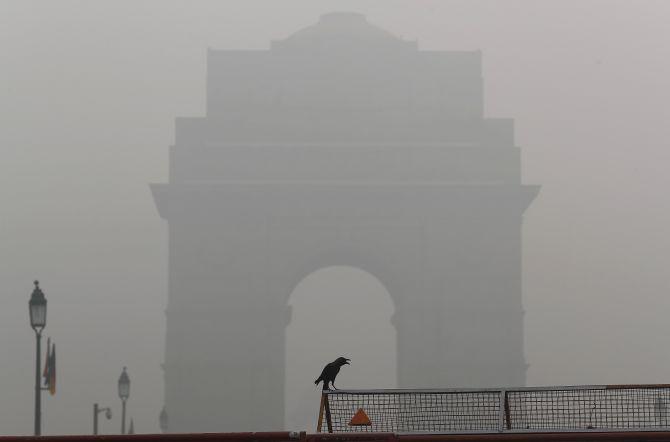'It is time to think up a policy of incentivising farmers in the states around Delhi.'
'Let's say a farmer is given an incentive for not burning his crop stubble and instead handing over the task of incinerating the crop stubble to a State-run-or-funded community initiative.'
'The incentive can take the form of, say, fertilisers, or even direct cash transfers,' recommends Somasekhar Sundaresan.

Yet another winter is upon us and yet again, Delhi is reeling under pollution and fog.
Schools have had to be closed as an emergency measure.
The state government has resumed its emergency road rationing measure.
A politician in the party ruling at the Centre has exhorted the cadre to defy the road rationing law, leading by example.
Meanwhile, a judiciary-initiated fiscal charge into the capital region has taken firm root, while crop stubble in the neighbouring agrarian states continue to be burnt at will.
Of course, through Diwali, firecrackers were used at will in Delhi.
Acquisition of new vehicles too has continued at will checked only by the economic slowdown (which too is a highly-contested and surcharged topic).
The challenge for policy-makers is essentially one of creating by law, a set of legitimate incentives for farmers not to burn their crop stubble after the harvest.
Or for that matter a set of legitimate disincentives against such burning. However, most policy-making in India is based on rendering an undesirable action illegal, and in fact, criminalising undesirable conduct.
The Indian faith in legislating the attainment of virtue is immense.
Even greater is the propensity to criminalise undesirable conduct.
In a nutshell, Indian policy-making has an excessive dependency on leveraging fear (or perceived fear) with the stipulation of punishment as a primary tool, as opposed to leveraging greed, with an incentive and disincentive structure nudging desirable behavioural outcomes.
It is time to think up a policy of incentivising farmers in the states around Delhi.
Let's say a farmer is given an incentive for not burning his crop stubble and instead handing over the task of incinerating the crop stubble to a State-run-or-funded community initiative.
The incentive can take the form of, say, fertilisers, or even direct cash transfers.
Wider community-run costs could be inflicted to nudge the choice towards the desirable option of not burning the crop stubble.
That there is only one-upmanship and petty finger-pointing is a pointer to there being no disincentive in the form of a political cost to the politicians voted into power by those societies.
So long as no political cost has to be paid, politicians will merrily exhort violation of vehicular restrictions, and indulge in denial of crop burning being the cause, and have Internet troll armies dish out memes that point to a particular chief minister alone being the cause of the failure.
All in all, the abject failure in designing an incentive system will keep the problem alive.
Meanwhile, all it would take is a publicity-seeking 'public interest litigant' to convince an excited bench to issue directions and judge-made law without either diagnosing the problem or testing the efficacy of the solution.
Until the next harvest, the next Diwali and the next fresh short-lived outrage over the appalling smog over the Republic's capital.
Delhi and the states around it would do well to study the incentives-based approach to conserving and protecting the endangered snow leopard in the Indian Himalayas.
Snow leopards were considered the enemies of the villagers in these states -- they would kill cattle which would cause immense financial losses to the villagers, who would in turn, either hunt or poison the snow leopards, which were fast en route to extinction.
A well-thought through programme has been successful. Here's how.
The villagers were assisted with setting up home-stay facilities for tourists.
Solar-powered light sticks were tried in villages to protect domestic cattle from the snow leopards.
Experiments showed that the light sticks worked, keeping attacks at bay.
In some villages, a simple wire mesh fencing did the trick.
Villagers who actually lost cattle to snow leopards got compensated through insurance, which replaced a compensation policy of the government that required villagers to travel long distances carrying evidence of the loss.
Earnings from home-stay tourists were reinvested in solar water heaters to enable hot showers, which in turn, brought in more tourism income.
Introducing awareness in school education has led to attitudinal changes at home with the kids influencing the households.
Snow leopard killings have gone down.
Their sightings have increased.
Now, villagers call the conservators to rescue even accidentally trapped snow leopards instead of effecting revenge killings.
The smog in Delhi is not insurmountable.
What it requires is some imaginative thinking, applying local intelligence to creating solutions based on perception of benefits.
The reliance on perception of fear of the law will not solve this problem.
Somasekhar Sundaresan is an advocate practising as an independent counsel.
Photograph: Adnan Abidi/Reuters











